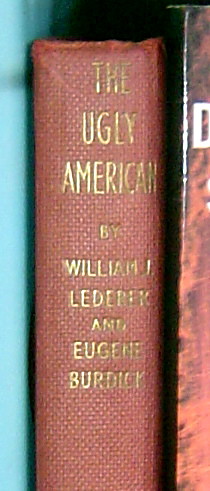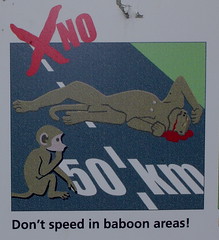The Ugly American
Katie and I have been here in Cape Town for six months next week. But back when I was still new at this ex-pat thing, still trying to figure out if we were going to fit in and how we were going to make this year in South Africa work, I stumbled over a book at our local used book store that I decided I had to have.
I swear I didn't buy the novel with the idea that it would provide any meaningful insight. Actually, I kind of bought it as a joke.
It was as if my worst fear was there, in the bookstore, staring back at me from the shelf.
The book was ''The Ugly American,'' a 1958 work of fiction about our countrymen and their successes and failures as they battled communism in southeast Asia before the Vietnam War.
 It's hardly one of the pinnacles of American literary achievement. The writing is wooden, the plot non-existant and the characters little more than stick figures. It's didactic and, from my vantage point at the start of the 21st century, its lessons are obvious.
It's hardly one of the pinnacles of American literary achievement. The writing is wooden, the plot non-existant and the characters little more than stick figures. It's didactic and, from my vantage point at the start of the 21st century, its lessons are obvious.
Obvious to me, anyway, though there are plenty of people stateside who could probably learn a thing or two from it.
I read its 285 pages cover-to-cover in one day, and despite its dubious literary merit, I found it fascinating.
The first surprise from the pages of the novel, then, is that the character the authors call the ugly American is not one of the bad guys. The book was chock-a-block full of willfully ignorant and atrociously arrogant ex-pats, with loudmouths and morons and fools living overseas who are confident that they have all the answers and that the peasants living underfoot are the only ones who need to do any learning. But the unattractive title character is an engineer, Homer Atkins, who ventures out into the countryside of a fictional southeast Asian country called Sarkhan, and works with the people he meets there to help them better their lives.
Of course, when we say someone is an ugly American these days, we mean they are boorish bulls in the china shop that is the world, offending people wherever they go without caring, or even knowing, about the destruction they are leaving in their wake. But in the book, which gave rise to the phrase, Atkins is literally, but not metaphorically, ugly. He's got the right attitude, and the right idea.
When the novel isn't spending time with Atkins in the jungles of Sarkhan, it's busy with the people we would now call the ugly Americans, all of them diplomats and politicians who are waging the war against communism in this remote country. These men are the ones who have no idea of what is actually happening in Sarkhan, who parade around with their one-size-fits all solutions, who treat the locals with disdain, who don't speak the language and don't see that as a problem.
In fact, the book was written as a critique of the American foreign service by two men, William Lederer and Eugene Burdick, who had spent considerable time in southeast Asia among the government employees there—enough time to conclude that the people who were setting and implementing our commie-crushing foreign policy in the region had absolutely no idea of what was actually happening on the ground.
It's not always--actually, it's not ever--done with subtlety. Here's an excerpt, wherein one of the more intelligent and right-minded Americans, John Colvin, is about to start a milk distribution program, but is attacked by an armed Sarkhanese man, Deong, who plans to poison the milk. Deong, of course, stops in mid-assassination to explain himself:
''… It’s a good idea,'' Deong says of Colvin's milk scheme. He continues:
''Out in the bush, we've talked it over a lot. But you’re the wrong person to be permitted to do it. If it succeeded, the Sarkhanese would believe that America was their savior.''
Colvin understood.
''Deong, you're a communist,'' Colvin said.
''As if there was a choice,'' Deong replied softly.
Elsewhere, characters give sermons worthy of an Ayn Rand novel.
''For some reason,'' says one man, a Burmese journalist named U Maung Swe, ''the Americans I meet in my country are not the same as the ones I knew in the United States. A mysterious change seems to come over Americans when they go to a foreign land. They isolate themselves socially. They live pretentiously. They're loud and ostentatious. Perhaps they’re frightened and defensive; or maybe they're not properly trained and make mistakes out of ignorance.''
That, of course, is the very definition of what we now call an ugly American, the exact thing that any half-aware ex-pat tries to recognize and resist in themselves. The specter of the ugly American, the worry that I'd confirm the worst fears of someone who already had some preconceived notion of what Americans are, dogged my every step the first few months we were here.
It's the reason we spent extra time trying to find a neighborhood to live in that was even half-way integrated, so we wouldn't be holing ourselves up with people who were too much like us--even though many people of means in this country barricade themselves behind security walls out in their guarded suburbs.
It was the worry that we'd project an image of know-it-alls that made us bite our tongues--and bite hard--even when white South Africans started spouting their warmed over racism, and told us how much better off everyone was 15 years ago.
We found ourselves whispering to each other in public places when everyone else was speaking normally.
I'd even vowed not to honk the car horn for these twelve months. That was a major sacrifice for me, as I'd been driving in New York for the previous six years. New Yorkers honk so often, it's stopped meaning anything. But not me. Not while I’m here. As if anyone could tell I was an American when I'm behind the wheel of our beat-up VW Golf--the same car, in the same color (white), that pretty much everyone else in this country seems to drive. Yes, the car was a conscious choice too.
In some ways, it's not fair. South Africans get to be rude, and we don't. Not that they are any ruder than anyone else in other parts of the world, but they aren't much more polite, either.
But if someone is rude to us, if they cut in line at the grocery store, or push in a crowd of people, or if someone from the monopoly telephone company gives Katie grief and then puts her on their list of potential cheats, we have to pause for a minute. The moment we open our mouths, we are branded as an Americans, so if we’re going to speak up, we had better be polite. Or would it be better not to speak up at all? For a long time, it was a constant tension, a constant fear: when I speak, I'm speaking for us all, us Americans, and I don't want to reinforce some stereotype that we're all pushy loudmouths who always expect to get their way.
Though, truth be told, if that's the image someone has of us collectively, it's not 100% wrong 100% of the time, is it?
More on this topic tomorrow. Can you tell I've been giving this topic some thought?
I swear I didn't buy the novel with the idea that it would provide any meaningful insight. Actually, I kind of bought it as a joke.
It was as if my worst fear was there, in the bookstore, staring back at me from the shelf.
The book was ''The Ugly American,'' a 1958 work of fiction about our countrymen and their successes and failures as they battled communism in southeast Asia before the Vietnam War.
 It's hardly one of the pinnacles of American literary achievement. The writing is wooden, the plot non-existant and the characters little more than stick figures. It's didactic and, from my vantage point at the start of the 21st century, its lessons are obvious.
It's hardly one of the pinnacles of American literary achievement. The writing is wooden, the plot non-existant and the characters little more than stick figures. It's didactic and, from my vantage point at the start of the 21st century, its lessons are obvious. Obvious to me, anyway, though there are plenty of people stateside who could probably learn a thing or two from it.
I read its 285 pages cover-to-cover in one day, and despite its dubious literary merit, I found it fascinating.
The first surprise from the pages of the novel, then, is that the character the authors call the ugly American is not one of the bad guys. The book was chock-a-block full of willfully ignorant and atrociously arrogant ex-pats, with loudmouths and morons and fools living overseas who are confident that they have all the answers and that the peasants living underfoot are the only ones who need to do any learning. But the unattractive title character is an engineer, Homer Atkins, who ventures out into the countryside of a fictional southeast Asian country called Sarkhan, and works with the people he meets there to help them better their lives.
Of course, when we say someone is an ugly American these days, we mean they are boorish bulls in the china shop that is the world, offending people wherever they go without caring, or even knowing, about the destruction they are leaving in their wake. But in the book, which gave rise to the phrase, Atkins is literally, but not metaphorically, ugly. He's got the right attitude, and the right idea.
When the novel isn't spending time with Atkins in the jungles of Sarkhan, it's busy with the people we would now call the ugly Americans, all of them diplomats and politicians who are waging the war against communism in this remote country. These men are the ones who have no idea of what is actually happening in Sarkhan, who parade around with their one-size-fits all solutions, who treat the locals with disdain, who don't speak the language and don't see that as a problem.
In fact, the book was written as a critique of the American foreign service by two men, William Lederer and Eugene Burdick, who had spent considerable time in southeast Asia among the government employees there—enough time to conclude that the people who were setting and implementing our commie-crushing foreign policy in the region had absolutely no idea of what was actually happening on the ground.
It's not always--actually, it's not ever--done with subtlety. Here's an excerpt, wherein one of the more intelligent and right-minded Americans, John Colvin, is about to start a milk distribution program, but is attacked by an armed Sarkhanese man, Deong, who plans to poison the milk. Deong, of course, stops in mid-assassination to explain himself:
''… It’s a good idea,'' Deong says of Colvin's milk scheme. He continues:
''Out in the bush, we've talked it over a lot. But you’re the wrong person to be permitted to do it. If it succeeded, the Sarkhanese would believe that America was their savior.''
Colvin understood.
''Deong, you're a communist,'' Colvin said.
''As if there was a choice,'' Deong replied softly.
Elsewhere, characters give sermons worthy of an Ayn Rand novel.
''For some reason,'' says one man, a Burmese journalist named U Maung Swe, ''the Americans I meet in my country are not the same as the ones I knew in the United States. A mysterious change seems to come over Americans when they go to a foreign land. They isolate themselves socially. They live pretentiously. They're loud and ostentatious. Perhaps they’re frightened and defensive; or maybe they're not properly trained and make mistakes out of ignorance.''
That, of course, is the very definition of what we now call an ugly American, the exact thing that any half-aware ex-pat tries to recognize and resist in themselves. The specter of the ugly American, the worry that I'd confirm the worst fears of someone who already had some preconceived notion of what Americans are, dogged my every step the first few months we were here.
It's the reason we spent extra time trying to find a neighborhood to live in that was even half-way integrated, so we wouldn't be holing ourselves up with people who were too much like us--even though many people of means in this country barricade themselves behind security walls out in their guarded suburbs.
It was the worry that we'd project an image of know-it-alls that made us bite our tongues--and bite hard--even when white South Africans started spouting their warmed over racism, and told us how much better off everyone was 15 years ago.
We found ourselves whispering to each other in public places when everyone else was speaking normally.
I'd even vowed not to honk the car horn for these twelve months. That was a major sacrifice for me, as I'd been driving in New York for the previous six years. New Yorkers honk so often, it's stopped meaning anything. But not me. Not while I’m here. As if anyone could tell I was an American when I'm behind the wheel of our beat-up VW Golf--the same car, in the same color (white), that pretty much everyone else in this country seems to drive. Yes, the car was a conscious choice too.
In some ways, it's not fair. South Africans get to be rude, and we don't. Not that they are any ruder than anyone else in other parts of the world, but they aren't much more polite, either.
But if someone is rude to us, if they cut in line at the grocery store, or push in a crowd of people, or if someone from the monopoly telephone company gives Katie grief and then puts her on their list of potential cheats, we have to pause for a minute. The moment we open our mouths, we are branded as an Americans, so if we’re going to speak up, we had better be polite. Or would it be better not to speak up at all? For a long time, it was a constant tension, a constant fear: when I speak, I'm speaking for us all, us Americans, and I don't want to reinforce some stereotype that we're all pushy loudmouths who always expect to get their way.
Though, truth be told, if that's the image someone has of us collectively, it's not 100% wrong 100% of the time, is it?
More on this topic tomorrow. Can you tell I've been giving this topic some thought?



0 Comments:
Post a Comment
<< Home